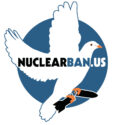Just as the world is rising up to demand action on climate change, so has the world been rising up to demand the elimination of nuclear weapons. Since the end of the Cold War, people in the US have largely forgotten about this issue. But not so in the rest of the world.
These weapons are in the hands of just nine countries, but the whole world would be affected if any were ever used. So, after 72 years of waiting for the nuclear-armed nations to get rid of these weapons, the rest of the world decided to take the matter into their own hands. On July 7, 2017, 122 countries at the United Nations adopted the Treaty on the Prohibition of Nuclear Weapons, or “Nuclear Ban Treaty.” This treaty outlaws everything to do with these weapons for all time.
The US did not participate in the treaty negotiations and so far refuses to sign it. But sooner or later, pressure from the rest of the world (including from other NATO countries) will force this country to address this lingering relic of the Cold War and eliminate its nuclear weapons. A Green New Deal makes this even more urgent.
As of February 2020, the Nuclear Ban Treaty has been signed by 81 countries and ratified by 35. The Treaty will enter into force once 50 countries have ratified it. Those countries are then expected to pass national legislation to enforce the provisions of the Treaty.
Article 1(e) of the Treaty makes it illegal to “assist, encourage, or induce anyone to engage in any activity prohibited under the Treaty.” As with other weapons prohibition treaties (like Chemical Weapons or landmines), this has been interpreted to also include a prohibition against financing the companies involved in producing the prohibited weapons, as well as a prohibition on taking part in activities that support the continued existence of these weapons.
The impact of this new Treaty will be felt most immediately by the two dozen or so private companies that make and maintain nuclear weapons for the US and other nuclear-armed states. Already, Deutsche Bank, Resona Holdings in Japan, and two of the largest pension funds in the world have moved to divest their funds from these companies.
Many other financial institutions have taken, or are now considering, similar action. Companies like Boeing, Honeywell, General Dynamics, Northrop Grumman, and Jacobs Engineering have offices, subsidiaries, suppliers, plants, projects and investors in dozens of countries around the world. They cannot ignore what goes on in those other countries, especially when laws are passed which could affect their global operations.
Hard as it is for many people in the US to imagine, this is the beginning of the end, not only for fossil fuels, but also for nuclear weapons. Just as the fossil fuel companies continue to resist the inevitable, so will the nuclear weapons companies.
But just as with climate change, the world is waking up to the existential threat of nuclear weapons. This opens up a unique opportunity for finally addressing both of these issues here in the US.
